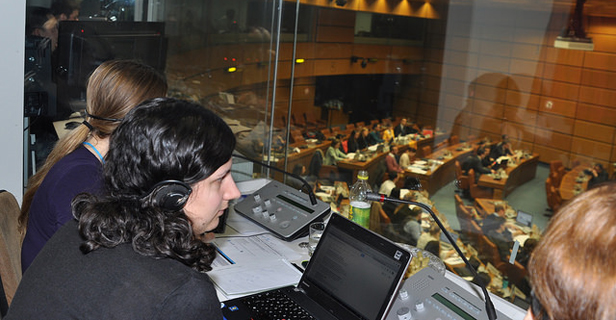
Dozens of students from Austria to Nepal participated in a simulated session of the General Assembly, sniffing the air of international politics in a real conference room at the UN Headquarters in Vienna.
The three topics they discussed - energy provision, climate migrants and sustainable agriculture and land use - were specifically chosen because of their relevance this year. With the COP 20 climate conference in Lima in December 2014 just over and the Millennium Development Goals (MDGs) coming to an end, 2015 is a year for global action on sustainable development and climate change. Several of the proposed Sustainable Development Goals (SDGs) that will succeed the MDGs refer directly or indirectly to the topics the students chose.
"Model UNs teach you to work together and to understand each other's positions and different cultures better. In short: they prepare you to live together on this small planet," said Martin Nesirky, Director of the United Nations Information Service (UNIS) in Vienna, in introductory remarks to the event, which was held from 15 to 16 January.
The 65 participating students all had different fields of study, such as land and water management, international development, animal breeding, environmental resources and economics. Forty-five of them took on the role of delegates from Member States, while an additional 10 were observers, all contributing their own unique set of views and expertise to the negotiating table.
Further adding to the realism, 10 students from the Department of Interpretation of the University of Vienna interpreted the discussions, covering six languages; English, German, Spanish, Russian, Italian and Hungarian.
"It is interesting how quickly everyone seems to adapt to their roles and take up the argument as representatives of their state, even if they do not identify themselves with these opinions in real life," said Michael Waniek, one of the participating students, during a break between negotiations.
The Model United Nations conference was organized by the University of Vienna, the University of Natural Resources and Applied Life Sciences Vienna (BOKU), and UNIVERSITAS, the Austrian interpreters' and translators' association, with the help of UNIS Vienna.